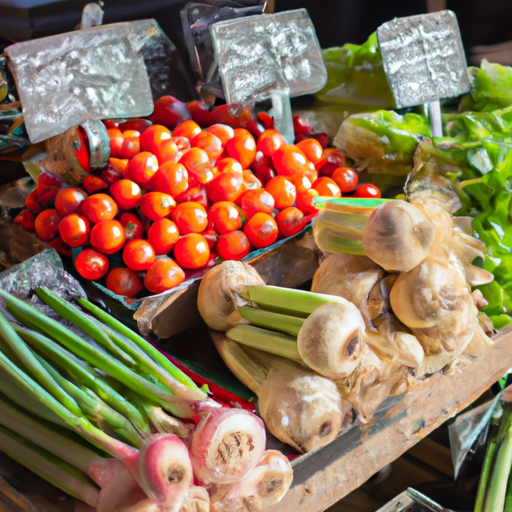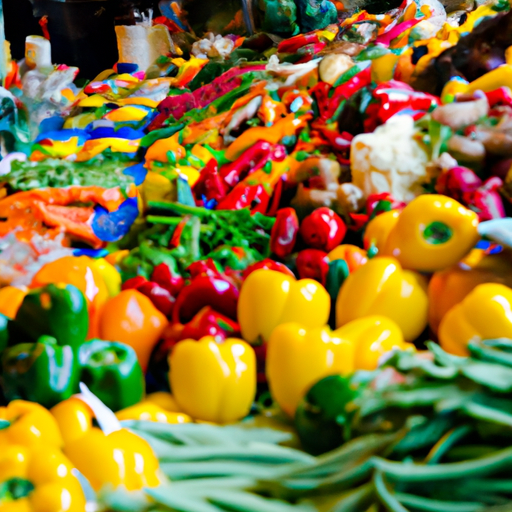Are you passionate about living a vegan lifestyle while also ensuring its sustainability? You’re not alone! Many individuals like yourself are seeking ways to make their plant-based choices align with environmental values.
The key question then becomes, what is the best way to ensure that a vegan lifestyle remains sustainable?
In this article, we will explore practical steps you can take to make a positive impact on the planet through your dietary choices.
First and foremost, understanding the environmental impact of your food choices is crucial.
By prioritizing whole foods and nutrient-dense meals, you can optimize both your health and the sustainability of your diet.
Additionally, minimizing food waste is essential in reducing greenhouse gas emissions and conserving resources.
Supporting ethical and sustainable brands and products is another important step towards maintaining a sustainable vegan lifestyle. By choosing companies that align with your values, you contribute to creating a more environmentally friendly market.
Furthermore, advocating for plant-based options in restaurants and cafes helps create demand for sustainable alternatives.
Stay educated and informed about veganism and sustainability so that you can make informed decisions that positively impact both yourself and the planet.
Lastly, engaging in community activities and activism allows you to connect with like-minded individuals who share your goals.
Key Takeaways
- Prioritize whole foods and nutrient-dense meals to optimize health and sustainability
- Minimize food waste to reduce greenhouse gas emissions and conserve resources
- Support ethical and sustainable brands and products to contribute to an environmentally friendly market
- Advocate for plant-based options in restaurants and cafes to create demand for sustainable alternatives
Understand the Environmental Impact of Your Food Choices
Understanding the environmental impact of your food choices is crucial in ensuring a sustainable vegan lifestyle.
By being aware of how your food is produced and its carbon footprint, you can make informed decisions that align with your values and contribute to a healthier planet.
Food production methods play a significant role in determining the environmental impact of what we eat.
Traditional animal agriculture requires vast amounts of land, water, and feed to sustain livestock.
This leads to deforestation, soil degradation, and water pollution.
On the other hand, plant-based foods generally have lower resource requirements and emit fewer greenhouse gases.
Additionally, considering the carbon footprint of your food choices is essential for sustainability.
Animal products are responsible for a substantial portion of global greenhouse gas emissions due to factors like methane release from livestock digestion and nitrous oxide from manure management.
By opting for plant-based alternatives, you can significantly reduce your carbon footprint.
Making conscious choices about what you eat empowers you to minimize harm to the environment. Choose locally sourced fruits and vegetables whenever possible to support local farmers while reducing transportation emissions.
Opt for organic options that prioritize sustainable farming practices without harmful pesticides or synthetic fertilizers.
By understanding the environmental impact of your food choices, you’re actively contributing to a more sustainable vegan lifestyle.
Your actions matter – they can help create a world where both humans and animals thrive in harmony with our planet’s resources.
Prioritize Whole Foods and Nutrient-Dense Meals
To maintain a vegan lifestyle that supports long-term health and the environment, focus on incorporating whole foods and nutrient-rich meals into your daily routine.
By prioritizing whole foods, you ensure that you’re consuming food in its most natural and unprocessed form, which not only provides essential nutrients but also helps minimize the environmental impact of your diet.
When it comes to getting enough protein on a plant-based diet, there are plenty of options available.
Meal planning is another key aspect of maintaining a sustainable vegan lifestyle.
By planning your meals ahead of time, you can ensure that you have all the necessary ingredients on hand and reduce food waste.
Take some time each week to plan out your meals, make a grocery list, and prep ingredients in advance whenever possible.
Remember, sustainability goes beyond just what we eat – it’s about making conscious choices that have a positive impact on our health and the environment.
By prioritizing whole foods and meal planning, you can continue to enjoy a nutritious vegan lifestyle while minimizing your ecological footprint.
Minimize Food Waste
One easy way to reduce food waste is by getting creative with leftovers and finding new ways to use them in delicious meals.
Instead of letting leftover vegetables, grains, or proteins go to waste, you can repurpose them into exciting dishes that will not only save you money but also contribute to a more sustainable vegan lifestyle.
A great way to approach this is by using a “leftover transformation” mindset.
Take a look at the ingredients you have on hand and challenge yourself to come up with innovative recipes that incorporate those leftovers.
For example, if you have some leftover roasted vegetables, you can turn them into a flavorful stir-fry by adding some tofu or tempeh and your favorite sauce.
To further inspire your creativity and help reduce food waste, here’s a table showcasing different types of commonly wasted foods and suggestions for how they can be used:
| Leftover Ingredient | Creative Idea |
|---|---|
| Overripe Bananas | Make banana bread or freeze for smoothies |
| Stale Bread | Create croutons or breadcrumbs for toppings |
| Vegetable Peels | Use them in homemade vegetable broth |
Remember, reducing food waste not only benefits the environment but also saves resources and reduces greenhouse gas emissions.
Another sustainable practice is composting leftovers instead of throwing them away.
By composting organic materials like fruit peels or coffee grounds, you can create nutrient-rich soil for your garden.
By making small changes like these in your daily life, you are actively contributing to the sustainability of your vegan lifestyle while enjoying delicious meals that make use of every ingredient available to you.
Support Ethical and Sustainable Brands and Products
Supporting ethical and sustainable brands and products is like choosing to walk through a vibrant, lush forest rather than a barren wasteland.
It not only aligns with your values as a vegan but also contributes to the overall sustainability of your lifestyle.
When it comes to clothing, opt for ethical fashion brands that prioritize fair trade practices and use eco-friendly materials such as organic cotton or recycled fabrics.
By supporting these brands, you’re promoting a more humane treatment of workers involved in the production process while reducing the environmental impact.
Similarly, when it comes to beauty products, choose sustainable options that are cruelty-free and free from harmful chemicals.
Look out for certifications like Leaping Bunny or PETA’s Beauty Without Bunnies program to ensure that the products you purchase are truly ethical.
Additionally, consider purchasing from companies that use minimal packaging or have refillable options to further reduce waste.
By consciously supporting ethical and sustainable brands and products across various industries, you become part of a larger movement towards creating a more compassionate and environmentally-friendly world.
You send a powerful message to businesses that there’s demand for these types of products, encouraging them to continue making positive changes.
In doing so, you build a sense of belonging within the vegan community while actively contributing to the long-term sustainability of your vegan lifestyle.
Advocate for Plant-Based Options in Restaurants and Cafes
Opt for plant-based options at your favorite restaurants and cafes to enjoy delicious meals that are both satisfying and compassionate.
By advocating for more plant-based options in these establishments, you can encourage innovation and promote inclusivity within the vegan community.
Here are some ways you can advocate for plant-based options:
-
Speak up: Let the restaurant or cafe staff know that you appreciate their current vegan offerings and would love to see even more plant-based dishes on the menu. Your feedback can make a difference and show them that there is a demand for these options.
-
Share your experiences: Use social media platforms or review websites to share your positive experiences with plant-based meals at different restaurants and cafes. This not only helps spread awareness but also encourages others to try these options.
-
Support vegan-friendly establishments: Seek out restaurants and cafes that already offer a variety of vegan choices. By supporting these businesses, you contribute to their success and send a message to other establishments about the demand for plant-based options.
-
Collaborate with local organizations: Connect with local vegan groups or organizations that work towards promoting plant-based lifestyles. Together, you can organize events or campaigns focused on encouraging restaurants and cafes to include more vegan-friendly choices.
Remember, by advocating for plant-based options in restaurants and cafes, you not only make it easier for yourself to maintain a sustainable lifestyle but also create a sense of belonging within the vegan community while contributing positively towards our shared goals of compassion and sustainability.
Stay Educated and Informed about Veganism and Sustainability
To ensure that your vegan lifestyle remains sustainable, it’s important to stay educated and informed about veganism and sustainability.
One way to do this is by reading books, articles, and watching documentaries that deepen your understanding of the subject.
Additionally, it’s crucial to stay updated on current research and developments in the field to make informed choices that align with your values.
Read books, articles, and watch documentaries to deepen your understanding
Immerse yourself in literature, articles, and documentaries to truly grasp the concepts underlying a sustainable vegan lifestyle.
Deepening your knowledge on this subject is crucial to navigate the complexities of veganism and sustainability effectively.
By exploring resources such as books, articles, and documentaries, you can gain valuable insights into the environmental impact of animal agriculture, ethical considerations, and health benefits associated with a plant-based lifestyle.
These materials not only provide you with credible information but also help you understand different perspectives and experiences within the vegan community.
Reading books like ‘Eating Animals’ by Jonathan Safran Foer or watching documentaries like ‘Cowspiracy’ can be eye-opening experiences that motivate you to make more informed choices in your daily life.
So grab a book or find a thought-provoking documentary—it’s time to expand your understanding and become an advocate for a sustainable vegan lifestyle!
Stay updated on current research and developments in the field
Stay in the loop and keep yourself informed about the latest research and advancements in the field, so you can visualize the progress being made towards a more sustainable world. Being up-to-date on current vegan research and sustainable lifestyle developments will help you make informed choices that align with your values.
Here are two sub-lists to deepen your knowledge:
Current vegan research:
- Stay connected with reputable vegan organizations and follow their social media accounts for updates on new studies and findings.
- Join online communities or forums where vegans share information about recent research articles, debates, and discussions.
Sustainable lifestyle developments:
- Follow environmental news outlets to learn about breakthroughs in plant-based alternatives, renewable energy sources, and eco-friendly practices.
- Attend conferences or webinars focused on sustainability to hear from experts who are driving positive change.
By staying updated, you’ll not only enhance your understanding but also contribute to a supportive community working towards a more sustainable future.
Engage in Community and Activism
By actively participating in community events and joining hands with fellow activists, you can create a powerful force for change and inspire others to embrace a sustainable plant-based lifestyle.
Community organizing and political activism play crucial roles in ensuring the long-term sustainability of veganism.
By getting involved in local groups or organizations that promote veganism, you can connect with like-minded individuals who share your passion for animal rights and environmental conservation.
Community organizing allows vegans to come together and coordinate efforts to raise awareness about the benefits of a plant-based lifestyle.
This can involve hosting educational workshops, film screenings, or potluck events where people can try delicious vegan dishes.
By engaging with your community in this way, you not only help dispel misconceptions about veganism but also foster a sense of belonging among those who are curious or interested in making the switch.
Political activism is another avenue through which vegans can make a lasting impact on society. By advocating for policy changes that support animal welfare and environmental protection, you become part of a larger movement fighting for systemic change.
This could include lobbying for stricter regulations on factory farming or supporting initiatives that promote sustainable agriculture.
By actively engaging in community events and embracing political activism as a vegan, you contribute to the larger goal of creating a more sustainable world.
Together with fellow activists, you have the power to influence others’ choices and inspire them to join the movement towards a plant-based lifestyle.
Conclusion
In conclusion, by following these steps, you can ensure that your vegan lifestyle remains sustainable.
Understanding the environmental impact of your food choices and prioritizing whole foods and nutrient-dense meals are crucial.
Minimizing food waste and supporting ethical and sustainable brands also play a significant role.
Advocating for plant-based options in restaurants and cafes, staying educated about veganism and sustainability, as well as engaging in community and activism activities will further contribute to a more sustainable vegan lifestyle.
Keep up the great work!



Recent Comments